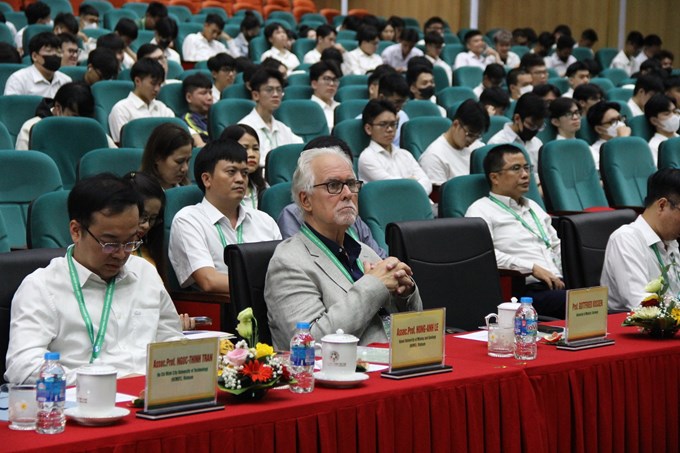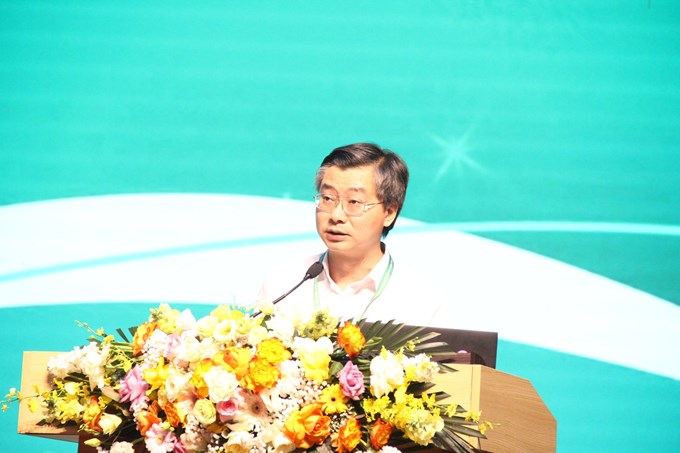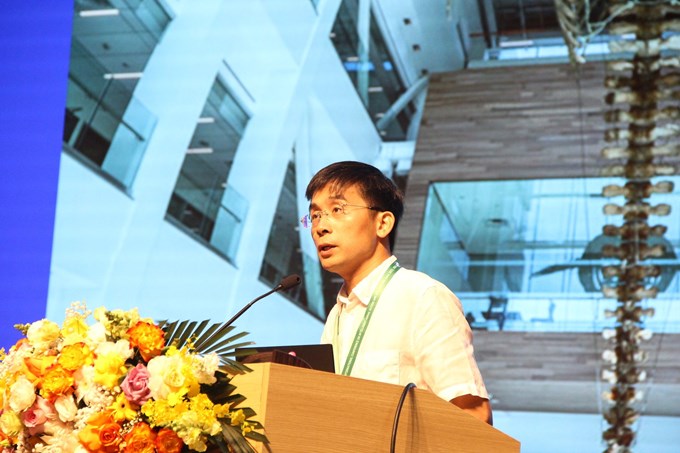From July 16 to 18, 2025, Vietnam National University of Agriculture (VNUA), in collaboration with Hanoi University of Mining and Geology and Ho Chi Minh City University of Technology, hosted the International conference on “Intelligent Aerial Access and Applications” (IAAA 2025).
According to the Organizing Committee, the IAAA 2025 Conference aimed to promote research and application of space technology and space communications in agriculture, industry, urban development, and related fields, while enhancing international cooperation. The conference focused on topics such as smart space access, space networks, remote sensing, artificial intelligence (AI), and practical applications in life and production.
The event brought together representatives from nearly 50 leading universities and research institutes both in Vietnam and internationally, along with renowned global experts and scientists in high-tech fields, communications, sensors, and big data.

The IAAA 2025 Conference brought together delegates from nearly 50 leading universities and research institutes both in Vietnam and abroad, along with renowned international experts and scientists.
Notably, the conference featured keynote speakers from the U.S.A., Germany, France, South Korea, and Japan—researchers with highly ranked publications in relevant fields. These experts presented breakthrough studies and shared the latest trends in space technology, sensors, AI, and their applications in sustainable development, modern agriculture, and various industries.
The conference served as a platform for scientists, administrators, businesses, and students to exchange and discuss cutting-edge research, foster interdisciplinary collaboration, and promote the application of space technologies in modernizing agriculture, industry, and urban development in Vietnam. It also contributed to implementing Resolution No. 57-NQ/TW dated December 22, 2024, by the Politburo on "Breakthrough development of science, technology, innovation, and national digital transformation."
Dr. Nguyen Cong Tiep, VNUA’s Vice President, emphasized that this year’s conference featured the participation of many distinguished professors from top global universities and research institutions, who delivered keynote presentations opening up new research directions and opportunities for collaboration.

Dr. Nguyen Cong Tiep, VNUA’s Vice President, delivers a welcome speech at the conference.
The conference received nearly 100 paper submissions, from which 39 were selected for presentation, reflecting strong international interest in the theme of the conference. Full papers would be published in the Lecture Notes in Networks and Systems (LNNS) series by Springer, which is indexed in Scopus—helping to spread the conference’s scientific value globally.
“As a leading center for education, scientific research, innovation, and technology transfer in agriculture in Vietnam, VNUA is committed to accompanying scientists and partners both domestically and internationally to promote scientific and technological development. Our aim is to build a smart, efficient agricultural system that adapts to climate change, contributes to national food security, and expands export markets,” said Dr. Nguyen Cong Tiep.
Mr. Pham Quang Dung, Acting Dean of the Faculty of Information Technology at VNUA, stated that IAAA 2025 showcased developments in software, hardware, and algorithms for intelligent space access and their applications in daily life, urban development, and smart agriculture. The conference helped to attract reputable scientists globally, which would also open collaboration opportunities and introduce students to cutting-edge technologies.

A presenter delivers his speech at the conference.
Mr. Dung stated that “Currently, the information technology sector is facing great development opportunities and has a long-term future. Therefore, career prospects in Information Technology and Computer Science are very promising, both domestically and internationally. Upon completing the training programs, students will not have to face the fear of unemployment.”
Meanwhile, Mr. Gottfried Vossen from the University of Münster, Germany, shared that it was his first time attending the IAAA conference and he was very impressed by the scale and quality of the presentations.
“We are witnessing a major trend, where artificial intelligence—especially AI—is advancing rapidly, and converging technologies are driving and reinforcing each other’s development”, said Mr. Gottfried Vossen.
The main topics presented at the IAAA 2025 Conference included: (i) Spatial hardware and measurement; (ii) Smart space access and applications; (iii) Space communication and networking; (iv) Management of service quality; (v) Security and privacy assurance; and (iv) Intelligent remote sensing.
In addition to the 39 papers presented, the conference was honored to welcome six renowned speakers from Canada, Germany, USA, France, Japan, and Vietnam. These speakers brought the latest scientific insights related to the conference’s themes.
Specifically, Prof. Trung Q. Duong from Memorial University, Canada, delivered a presentation on the topic “Quantum Machine Learning and Optimization for 6G Networks, highlighting the remarkable advancements in quantum machine learning and optimization”, while also providing a comprehensive overview of its potential through a machine learning–based approach.
Prof. My T. Thai from the University of Florida, USA, delivered a presentation entitled “Federated Learning – A Promising Development or Just an Illusion?”, exploring the potential and current limitations of this emerging field.
Speaker Tran Xuan Nam from Le Quy Don University, Vietnam, shared the latest advancements in UAV-based communication technologies, focusing on the use of UAVs as aerial base stations. His speech emphasized the integration of UAVs with cutting-edge technologies such as Non-Orthogonal Multiple Access (NOMA), Intelligent Reflecting Surfaces (IRS), and short-packet transmission techniques to achieve ultra-reliable and low-latency communication.
Speaker Gottfried Vossen from the University of Münster, Germany, delivered a presentation entitled "When Artificial Intelligence (AI) Reaches for the Skies”. He highlighted how Generative AI (GenAI) had demonstrated transformative potential across a wide range of applications — from text generation and programming to creating images and videos. Current GenAI models could now enhance image resolution, fill in missing data, optimize noisy datasets, and simulate real-world scenarios both locally and globally. These capabilities unlocked new opportunities in areas such as environmental monitoring, disaster response, and infrastructure planning. Vossen emphasized that these potentials were further strengthened by Agentic AI and advancements in robotics. Consequently, it was no surprise that such powerful technologies were expected to extend into remote sensing and aerial platforms, including satellites and unmanned aerial vehicles (UAVs).
Prof. Sylvain Guilley from Secure-IC S.A.S., France, delivered a presentation on "Security in Data Centers for AI Applications." He emphasized that cybersecurity was the key to AI infrastructure and requires the integration of multiple technologies, which had to be seamlessly embedded into data factories operating under tight data flow conditions.
Prof. Koichiro Ishibashi from the University of Electro-Communications, Japan, gave a presention on "Beat Sensors and Lightweight Data Encryption for IoT Sensors with High Capacity and Long Range." His talk focused on enhancing the efficiency and security of IoT systems, particularly in applications that demand high data throughput and extended communication ranges.
Computer Networks and Data Communications is a field of study that focuses on the principles of networking, methods for analyzing, designing, building, operating, and managing network systems—from local area networks (LANs) to wide area networks (WANs) connecting globally. At the same time, this field equips learners with advanced skills for developing applications on networked computer systems, from intermediate to high-level systems.
By pursuing this major, students will gain an understanding of and master widely used network services such as the World Wide Web (WWW), email, file sharing, and multimedia. You will also be introduced to cutting-edge technologies such as the Internet of Things (IoT), cloud computing, network programming and automation, as well as cybersecurity and information security techniques.